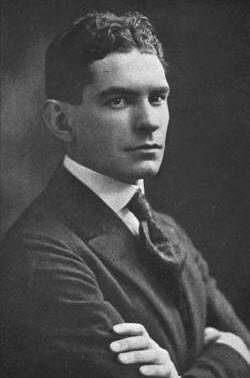EDWARD NEWELL WARE, Junior
Born April 5, 1892, at Florence, Wisconsin. Son of Reverend Edward N. and Cora Willis Ware. Home, Chicago, Illinois. Educated Lake View High School, Chicago. Business, four years. Northwestern University, Evanston, Illinois, Class of 1916. Joined American Field Service, May 5th, 1917; attached Section Thirteen. Enlisted U.S.A. Ambulance Service with French Army. Gassed November, 1917, near Verdun. Joined Hoover Food Commission, February, 1919, at Paris. Died of smallpox at Bucharest, Roumania, May 7, 1919. Buried Military Cemetery, Bucharest.
With a sensitive, artistic mind, ‘interested in books, architecture, art, and music,’ Edward Newell Ware, Jr., combined unusual firmness of mind and sturdiness of character. Unwilling to continue college after his freshman year because of the burden upon his father’s shoulders, he gave up his cherished hopes and set resolutely to work in a field for which he had no love, but which he mastered so completely that, at the end of four years, he was able to resume his place in the School of Engineering of Northwestern University. He was initiated into the Beta Theta Pi fraternity and became a leader in its activities,–‘an inspiration to all who were associated with him.’ ‘Architecture was his goal,’ says his mother, ‘to which his constructive ability and his appreciation of art led him.’ He advanced rapidly and stood high on the Honor Roll for scholarship when the war made a second and final interruption of his career. He enlisted in the American Field Service and sailed for France on May 5, 1917.
He gave himself as wholeheartedly to the work of transporting the wounded as to everything else he has ever undertaken. ‘He was the most courageous and fearless of us,’ says a comrade; and others speak of ‘his wonderful devotion to his wounded.’ and his self-sacrificing helpfulness on all occasions. In November, 1917, he was badly gassed, but his love of action and desire to be with the Section soon brought him back from the hospital where he might have had a much longer convalescence. He was loved by his companions, as he had been at college, not only for the strange beauty of his nature, but also for his courageous independence of spirit which led him, regardless of consequence, into generous and brotherly acts. With instinctive sympathy for the ‘under dog,’ he used to be particularly friendly to fellows in the Section who, through some accident or slight fault, had become temporarily unpopular. Music was the great comfort and delight of his life. It exalted him, lifting him above the ‘dreadful circumstance of war’ into the beautiful places where his delicate and impressionable imagination wandered joyous and free. It was this imagination of his that made him so keenly alive to the horror and suffering of war, and caused him to bear equally with his wounded the pain caused by long journeys over frightful roads.
After the Armistice, instead of returning home with his unit, Newell volunteered his services to the Hoover Food Commission, and after serving for a short time in Paris, was sent out with a small contingent to bring help to the poor and suffering of Romania. He rejoiced in what he referred to as ‘this very minor sort of role in the economic reconstruction of a romantic story book country, poor Romania.’ It was while working in the midst of famine and disease that he contracted smallpox, from which he died on May 7, 1919. He was buried with full military honors in the cemetery of Bucharest.
Newell’s sympathies were broad and quick, his generosity ready and open, and his character unflinchingly upright. The many friends who wrote to his mother on learning of his death were all impressed by the fact, that no word or deed had ever swerved the least bit from ‘the high ideals of pure, true manhood which he held.’ ‘He not only stood for the right and best,’ says his fraternity paper, ‘but he had the supreme courage of his convictions.’ It is this completeness of his spiritual and moral development that alone can lessen the tragedy of his unrealized hopes and ambitions.”
Source: Memorial Volume of American Field Service in France, by James William Davenport Seymour, by American Field Service Society, Boston, 1921, pages 243-44

PRIVATE CITIZENS SUPPORTING AMERICA'S HERITAGE
American
War Memorials Overseas, Inc.
War Memorials Overseas, Inc.
Ware Edward Newell Jr.
Name:
Edward Newell Jr. Ware
Rank:
Private First Class
Serial Number:
Unit:
American Red Cross Ambulance Service
Date of Death:
1919-05-07
State:
Illinois
Cemetery:
Bucharest Bellu Cemetery (Cimitirul Bellu Bucureşti), Bucharest, Romania
Plot:
Row:
Grave:
Decoration:
Comments:
